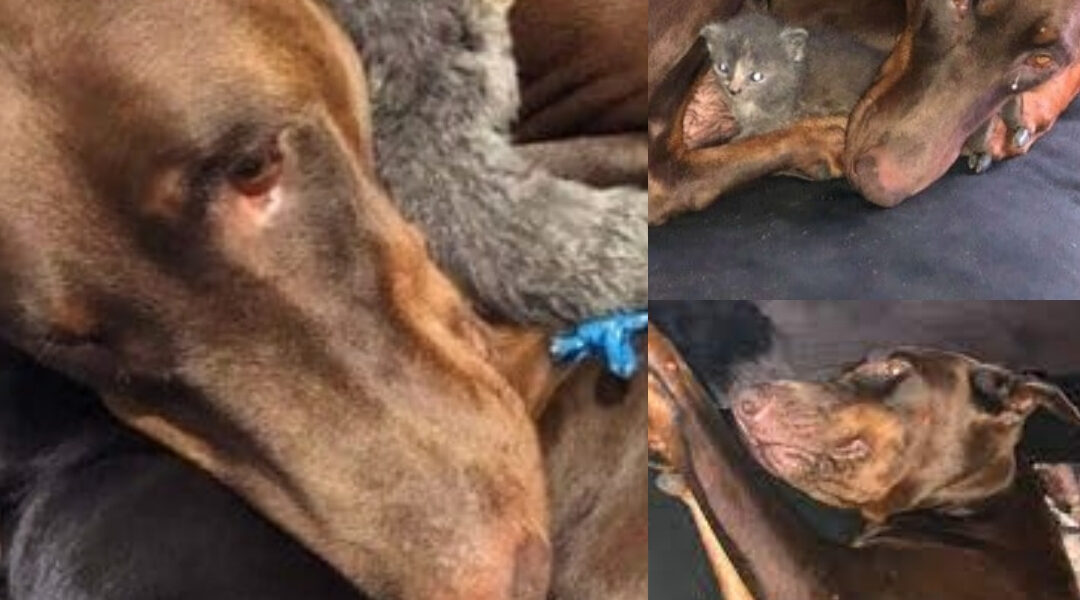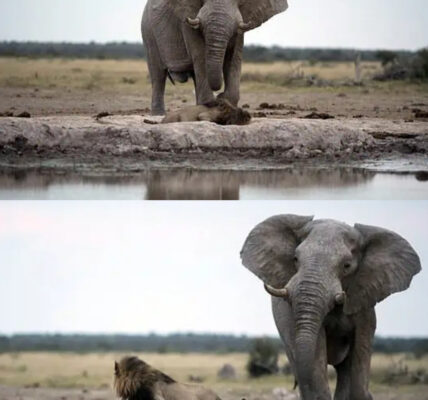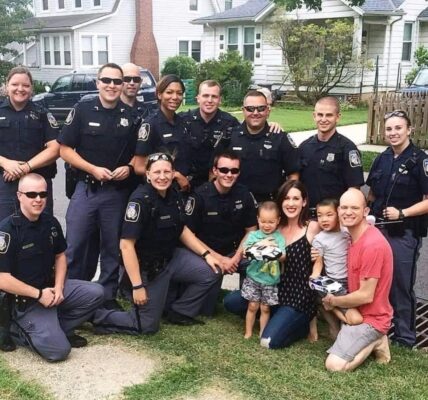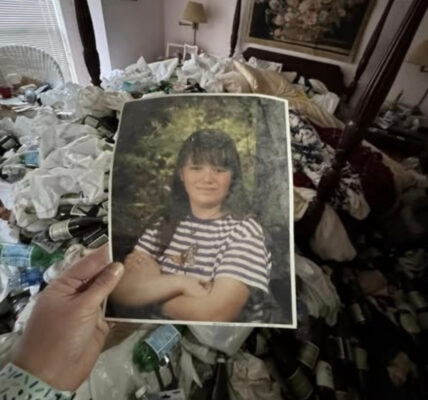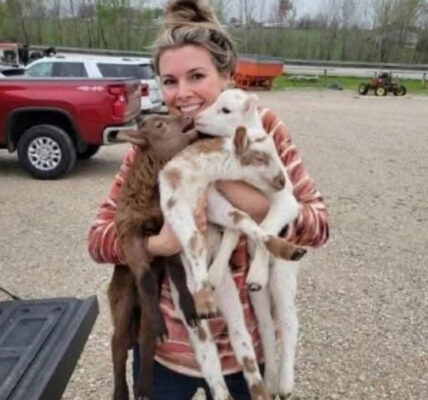
The morning was cold, the kind of chill that settled deep into the soil and made even the birds hesitant to sing. Dew clung to the garden grass like tiny tears, and in the stillness, a faint sound broke the silence — soft, desperate, almost invisible.
It was a cry too small for the world to notice.
But one heart did.
A large brown Doberman lifted her head from her bedding, ears twitching toward the sound. Her name was Hera — strong, steady, and gentle in ways that defied her reputation. Only a week earlier, she had given birth to a litter of pups. Her world had become a circle of warmth and milk and tiny, squirming bodies pressed close to her chest.
Yet that morning, something called to her from beyond her nest.
The Cry in the Garden
The sound came from near the fence, buried under fallen leaves. Hera rose, careful not to disturb her sleeping pups, and padded across the yard. Her paws sank into the damp soil as she followed the faint cry — the fragile voice of something fighting to be heard.
There, half-hidden in the shadow of a bush, lay a newborn kitten. Its fur was matted, barely dry. Its eyes were sealed shut, its breaths thin and uneven. It had been left behind — abandoned by the mother who couldn’t return, or wouldn’t.
Hera stood over it, her breath forming soft clouds in the morning air. The kitten’s tiny body trembled, its mew barely more than a whisper. For a long moment, Hera simply watched, the primal language of nature pulling her in two directions — instinct telling her to walk away, compassion urging her to stay.
Then, without hesitation, she lowered her great head and nudged the kitten gently with her nose.
It was warm — but fading.

The Choice
Inside the house, Hera’s owner, Dmitri, poured himself coffee, unaware that life in his garden was about to change. He turned when he heard the familiar scrape of claws on the back door.
When he opened it, Hera stood there, something small and gray tucked gently in her mouth.
“Что это, девочка?” he murmured, crouching. “What have you got there?”
She walked past him carefully, her steps deliberate, carrying the tiny creature as though it were made of glass. Dmitri followed, puzzled — until Hera reached her bed.
There, among her black-and-tan puppies, she placed the kitten. The pups stirred, whining softly, their noses twitching at the unfamiliar scent. The kitten, barely conscious, let out one last faint mewl before curling instinctively toward the warmth.
Then Hera did something that left Dmitri speechless.
She lay down beside it, curling her body protectively around the helpless newcomer. Her great head rested beside the kitten, her nose brushing against its fragile ribs with a tenderness that could only be called maternal.
A Mother Once More

At first, Dmitri didn’t know what to do.
A kitten among puppies — it felt impossible. Nature wasn’t built for this. Yet Hera’s calm, watchful eyes told him everything he needed to know.
So he fetched a small blanket, warmed a bit of milk, and together they began the quiet rescue. For the rest of the day, Hera barely moved. She licked the kitten clean, nosed it toward her belly, and when it couldn’t feed, she waited patiently for Dmitri to bring the bottle.
By evening, the kitten was breathing evenly, its tiny paws flexing against Hera’s fur.
When night came, Hera wrapped herself around her family — her pups and her new, unlikely child. The kitten’s gray fur was lost among the dark coats of her litter, but she knew exactly where it was. Her paw rested gently across it, as if to say, You are mine now.
Days of Quiet Miracles
In the days that followed, Hera’s den became a symphony of soft sounds — the squeaks of puppies, the faint mews of the kitten, the slow, rhythmic breathing of a mother who had chosen love over instinct.
Dmitri watched in awe.
The kitten, which he named Misha, began to grow stronger. It nestled against Hera’s side, its head rising and falling with her steady breaths. Sometimes it would climb clumsily over her foreleg, getting lost among the puppies until Hera gently lifted it back with her mouth.
She treated it no differently — cleaning it, warming it, guarding it. When one of the puppies rolled too close, she used her nose to shift them all closer together, creating a circle of belonging where none should have existed.
What amazed Dmitri most was how the puppies accepted the newcomer. Perhaps because Hera did. In her eyes, there was no difference between her own and the orphan she had found.
The Day Misha Opened His Eyes
On the seventh morning, Dmitri came to check on them and found Hera lying awake, her gaze fixed on something small in her paws.
Misha’s eyes had opened — pale blue and unsteady, but alive. The kitten blinked at the world for the first time, then at Hera. She leaned down and nuzzled his head softly, her tail thumping once against the floor.
It was a simple moment, yet something profound stirred in the room — a reminder that love, when pure, doesn’t ask questions. It simply is.
The Bond That Grew
Weeks turned into months, and the house became a portrait of unexpected harmony.
Misha grew faster than Dmitri imagined. He learned to walk by following the puppies, stumbling over his own paws but determined to keep up. When they wrestled, he pounced in — all fur and squeaks — and Hera, ever watchful, kept her gaze on him, ensuring no game grew too rough.
When he tired, he would climb atop her back or curl under her chin, purring himself to sleep against the rhythmic beat of her heart.
And Hera? She seemed calmer than ever. Something in her had changed — as though saving that kitten had awakened an old, quiet wisdom in her.
To Dmitri, she was no longer just a dog. She had become a symbol of what it means to care — not just for your own, but for any life that needs you.

Whispers of the Village
Word spread quickly through the small Siberian town. Neighbors came by to see “the dog who adopted a kitten.” Some came out of curiosity, others out of disbelief.
One elderly woman, her eyes misty, whispered, “That’s not an animal’s heart — that’s a saint’s.”
Children brought bits of food and toys, eager to see the strange family. Misha, growing bolder by the day, would bat at their shoelaces while Hera watched, patient as ever.
Dmitri noticed something else too — people lingered longer near his gate, smiling. For a place often heavy with the weight of winter, Hera’s quiet act had become a small flame of hope.
The Lesson of Hera
Months later, when the puppies were old enough to go to their new homes, Dmitri worried how Hera would react. But she surprised him again.
She watched each pup leave with calm eyes, licking them goodbye one by one. When the last had gone, she turned, walked back to her bed — and there, waiting for her, was Misha.
The little cat climbed onto her paw and rubbed his face against her chest, purring like a tiny engine. Hera sighed, curling around him once more.
Dmitri knelt beside them, feeling an ache in his chest that was equal parts sorrow and joy. “You kept one child,” he whispered.
Perhaps that was how it was meant to be.
Years Later
By the next spring, Misha had grown into a sleek, confident cat — but he never strayed far from Hera’s side. Wherever she went, he followed: into the garden, onto the porch, even to the gate where she watched sunsets.
They had become inseparable — predator and prey in the eyes of nature, but in their world, they were family.
Sometimes, Dmitri would sit on the steps and watch them together — Hera lying in the sun, eyes half-closed, while Misha kneaded her fur before curling up against her.
And he would think about the morning that started it all — the moment she chose to walk toward a cry instead of away from it. That single act had rewritten both their stories.
A Heart Without Borders

When Hera grew older and her steps slowed, Misha was always near. He would curl against her in the evenings, grooming her face with tiny, careful licks, as if repaying a debt only he understood.
On the final morning of Hera’s life, the sky was painted in soft gold. Dmitri found her lying peacefully in her favorite spot by the window, Misha pressed close against her side, purring faintly.
Her eyes were closed, her breath gentle — and even in stillness, she seemed at peace.
Misha stayed there for hours, unmoving, his paw resting on her fur. When he finally rose, he walked to Dmitri, rubbed his head against the man’s hand, and returned to the empty bed.
He curled up there, where her scent still lingered, and slept.
The Echo That Remains
Years later, when people told Dmitri that animals couldn’t feel compassion, he would smile and show them a photograph — a brown Doberman sleeping with a gray kitten nestled against her chest.
“This,” he would say softly, “is what love looks like when it doesn’t ask for reasons.”
In the garden where it all began, a small stone stands beneath the lilac bush. On it, Dmitri carved a single line:
“A mother’s heart knows no boundaries.”
Every spring, Misha still lies there in the grass, eyes half-closed, as the breeze rustles the leaves. And sometimes, if the wind is just right, it sounds like the low sigh of a mother keeping watch — gentle, eternal, and full of love.
